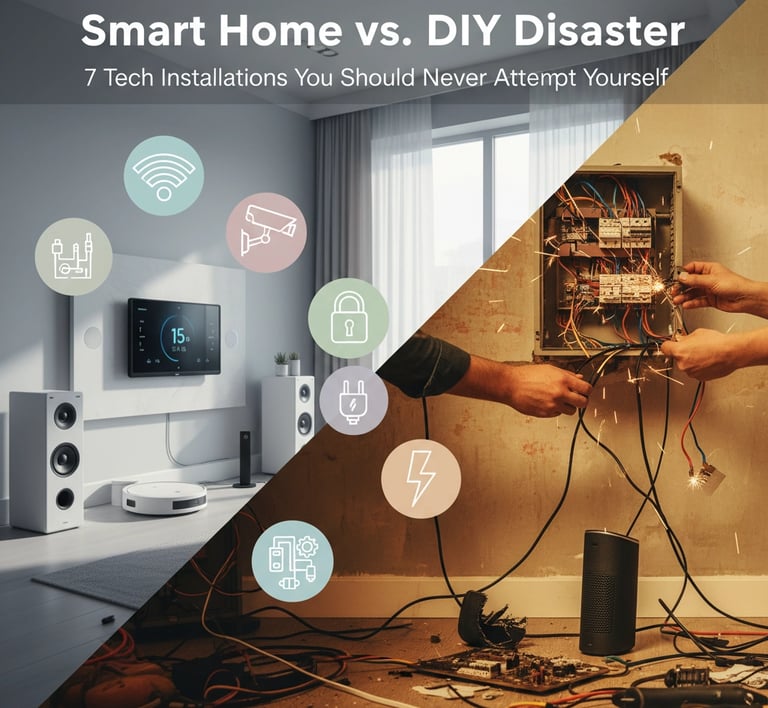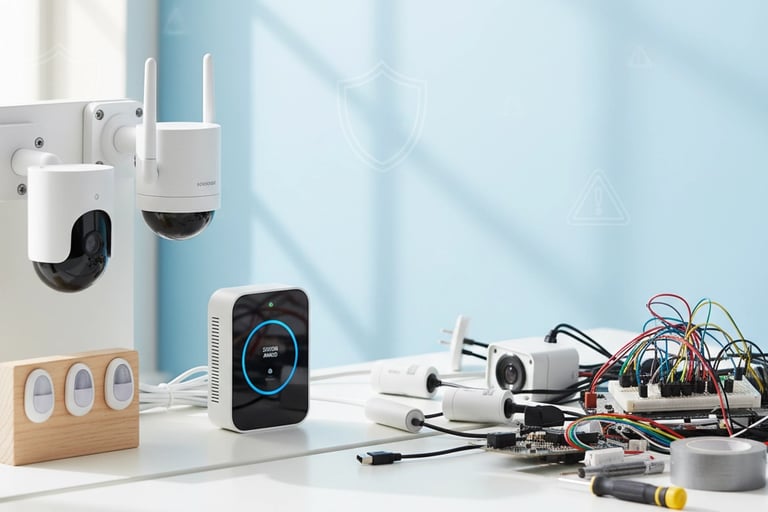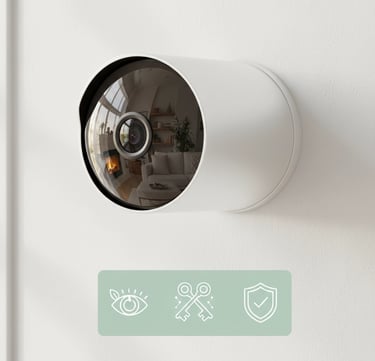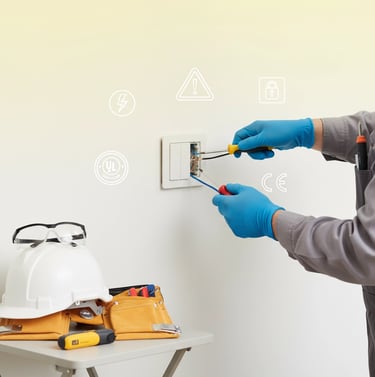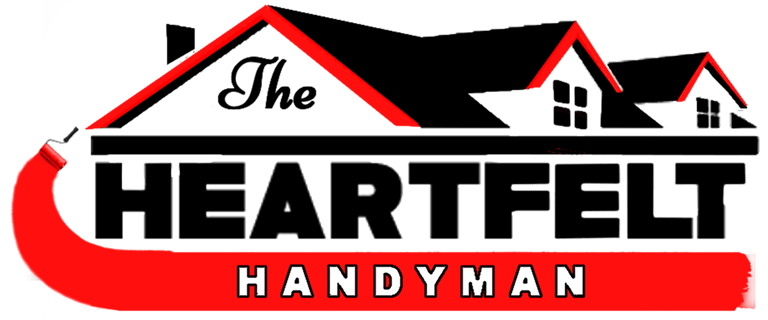
Smart Home vs. DIY Disaster:
7 Tech Installations You Should Never Attempt Yourself
Smart homes promise convenience, security, and efficiency, but they can quickly
become expensive nightmares when DIY installations go wrong. While YouTube tutorials
make everything look simple, some tech installations are complex enough that one
mistake can compromise your home's security, safety, and functionality.
If you're considering smart home upgrades, here are seven installations you should
definitely leave it to the professionals.
1. Comprehensive Security Systems with Multiple Components
Installing a complete security system isn't just about mounting cameras and plugging in sensors. Modern smart security systems involve multiple integration points, network configurations, and security protocols that require expertise to implement correctly.
Why DIY is risky:
Device hijacking can occur within minutes of improper installation
One unsecured device can compromise your entire network
Improper network segmentation leaves all your smart devices vulnerable
Integration issues between different brands create security gaps
Professional installers understand how to properly segment networks, configure firewalls, and implement encryption protocols. They also know which devices work best together and how to prevent the security vulnerabilities that make headlines when homeowners' cameras get hacked.
2. Hardwired Smart Home
Hubs and Central Control
Systems
Your smart home hub is essentially the brain of your entire system. When this central control point isn't properly secured and configured, hackers can potentially access everything connected to it: from your door locks to your personal data.
The professional difference:
Proper network isolation to prevent total system compromise
Advanced encryption and access controls
Regular security updates and monitoring
Professional-grade equipment with better security features
DIY hubs often lack the robust security measures needed to protect your home and privacy. Professional installation ensures your hub becomes a fortress, not a gateway for intruders.
3. Integrated Surveillance Camera Networks
Camera systems seem straightforward: mount them up and connect to Wi-Fi, right? Wrong. Improperly installed cameras create serious privacy and security risks that go far beyond just poor video quality.
What can go wrong:
Software vulnerabilities allow hackers to view live feeds
Compromised cameras can be used to spy on families
Poor encryption makes footage accessible to unauthorized users
Inadequate storage solutions can lead to data breaches
There have been disturbing reports of hackers talking to children through compromised cameras. Professional installers implement proper encryption, secure storage, and access controls that keep your family safe from digital intruders.
4. Whole-Home
Automation Networks
Creating a truly integrated smart home where lighting, HVAC, entertainment, and security work seamlessly together requires sophisticated programming and extensive technical knowledge.
DIY limitations:
Devices designed for isolation won't communicate effectively
Complex programming requirements beyond typical homeowner skills
Compatibility issues create frustrating gaps in functionality
Troubleshooting problems becomes nearly impossible
Professional smart home installers have the certifications and experience to create systems that actually work together. They understand which protocols and standards ensure reliable communication between devices.
5. Smart Electrical Systems and High-Voltage Components
Any smart home upgrade involving electrical work beyond simple plug-in devices requires professional expertise. Smart switches, outlets, and electrical panels involve safety risks that can result in fires, electrocution, or code violations.
Why electrical work needs professionals:
Building codes require proper permits and inspections
Improper wiring creates fire hazards
Insurance may not cover DIY electrical damage
Smart electrical components require specific installation procedures
Licensed electricians understand load requirements, proper grounding, and safety protocols. They also ensure your installations meet local codes and won't cause problems during home inspections or insurance claims.
6. Enterprise-Grade
Network Infrastructure
A robust smart home requires more than just good Wi-Fi. It needs professional-grade network infrastructure with proper security configurations, bandwidth management, and device isolation.
Network security essentials professionals provide:
VPN configuration for remote access
Advanced firewall setup and monitoring
Network segmentation to isolate smart devices
Protection against man-in-the-middle attacks
Guest network configuration for additional security
DIY network setups often leave massive security holes. Professional network configuration ensures your valuable personal information stays protected while maintaining reliable connectivity for all your smart devices.
7. Cloud-Connected Voice and AI Systems
Advanced voice control and AI systems that integrate with cloud services collect extensive personal data and control multiple home functions. Improper configuration can lead to serious privacy breaches and unauthorized access.
Privacy and security concerns:
Voice recordings stored without proper encryption
Personal data shared with unauthorized third parties
AI systems with inadequate access controls
Cloud storage without proper security protocols
Professional installation includes privacy controls, data encryption, and secure cloud configuration that DIY setups frequently overlook. They understand how to balance functionality with privacy protection.
When Professional Installation Makes Sense
The reality is that IoT devices can be compromised in less than five minutes after installation when security isn't properly configured. Many popular smart home devices have design flaws that leave them vulnerable to cyberattacks, data leaks, and break-ins.
Professional installers provide several crucial advantages:
Ongoing support and updates that keep systems secure
Proper warranties and aftercare for long-term reliability
Integration expertise that makes systems actually work together
Security protocols that protect your family and data
Code compliance that satisfies inspections and insurance requirements
Smart Choices for Smart Homes
Smart home technology can truly improve your life when implemented correctly. The key is recognizing which installations require professional expertise and which you can safely tackle yourself.
Simple plug-in devices, basic smart bulbs, and standalone gadgets are generally fine for DIY installation. But when it comes to integrated systems, electrical work, security components, or anything involving your home's infrastructure, professional installation provides the expertise and peace of mind you need.
Your smart home should make life easier, not create new headaches. By choosing professional installation for complex systems, you're investing in reliability, security, and functionality that will serve your family for years to come.
Need help with your smart home installation? The Heartfelt Handyman has the experience and certifications to handle everything from TV wall mounting to complex smart home integrations. We'll make sure your technology upgrades are done right the first time.
